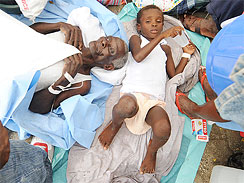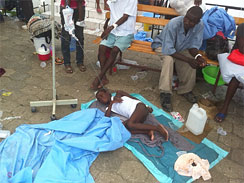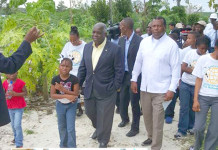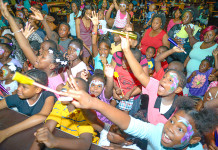Aid Groups Rush in Supplies as Deadliest Outbreak Since Earthquake Hits Refugees; 1,000 Said to be Infected

By CBS/AP
Haiti — At least 142 people have died in a cholera outbreak, and aid groups are rushing in medicine and other supplies Friday to combat Haiti’s deadliest health problem since its devastating earthquake.
(Scroll down to watch video of the outbreak in Haiti)
The outbreak in the rural Artibonite region, which hosts thousands of quake refugees, raised fears of an epidemic spreading to squalid tarp cities, where homeless quake survivors are vulnerable to disease because of poor sanitation.
“We have been afraid of this since the earthquake,” said Robin Mahfood, president of Food for the Poor, which was preparing to fly in donations of antibiotics, dehydration salts and other supplies.
Many of the sick have converged on St. Nicholas hospital in the seaside city of St. Marc, where hundreds of dehydrated patients lay on blankets in a parking lot with IVs in their arms as they waited for treatment.
Health Ministry director Gabriel Thimothe said laboratory tests confirmed that the illness is cholera. He said Friday that 142 people have died and more than 1,000 infected people were hospitalized.
The president of the Haitian Medical Association, Claude Surena, said people must be vigilant about hygiene and wash their hands frequently to slow the spread of the disease.
“The concern is that it could go from one place to another place, and it could affect more people or move from one region to another one,” he said.

David Darg, international disaster relief director for Operation Blessing International told CBS News on Thursday it was the worst outbreak of disease he had seen since the earthquake, and many lying outside of the hospital were children.
Video: Disease Outbreak in Haiti
Barg told the BBC Friday that he has worked previously with cholera victims, and, “from my perspective it is cholera” affecting the Haiti refugees now. “It has all the signs.”
Barg said the good news was that relief organizations had been able to mobilize quickly and get clean drinking water into the area hit by the outbreak.
Cholera is a waterborne bacterial infection spread through contaminated water. It causes severe diarrhea and vomiting that can lead to dehydration and death within hours.
Health Minister Alex Larsen urged anyone suffering diarrhea to make their own rehydration serum out of salt, sugar and water to drink on the way to a hospital.
Michel Thieren, a program officer for the Pan-American Health Organization, said hospitals in the region have enough IV treatments for now but stocks will need to be replenished.
“Most of the cases can be done with oral treatment, but here we have a significant number that require IV treatment,” he said.
No cholera outbreaks had been reported in Haiti for decades before the earthquake, according to the U.S. Centers for Disease Control and Prevention. Haitian officials, including President Rene Preval, have been pointing to the lack of severe disease outbreaks as a success of the quake response.
With more than a million people left homeless by the disaster, however, experts have warned that conditions are ripe for disease to strike in areas with limited access to clean water.
At the hospital, some patients including 70-year-old Belismene Jean Baptiste said they got sick after drinking water from a public canal.
“I ran to the bathroom four times last night vomiting,” Jean Baptiste said.
The sick come from across the Artibonite Valley, a starkly desolate region of rice fields and deforested mountains. The area did not experience significant damage in the Jan. 12 quake but has received thousands of refugees from the devastated capital 45 miles (70 kilometers) south of St. Marc.
Most of the refugees in the area were absorbed into communities, in contrast with the hundreds of thousands living in squalid tarp cities in Port-au-Prince, according to U.N. humanitarian spokeswoman Imogen Wall.
Trucks loaded with medical supplies including rehydration salts were to be sent from Port-au-Prince to the hospital, said Jessica DuPlessis, an OCHA spokeswoman. Doctors at the hospital said they also needed more personnel to handle the flood of patients.
Elyneth Tranckil was among dozens of relatives standing outside the hospital gate as new patients arrived near death.
“Police have blocked the entry to the hospital, so I can’t get in to see my wife,” Tranckil said.
The U.S. Embassy in Port-au-Prince issued an advisory urging people to drink only bottled or boiled water and eat only food that has been thoroughly cooked.
OPERATION BLESSING HAITI – DISEASE OUTBREAK B-ROLL from OB UK on Vimeo.







